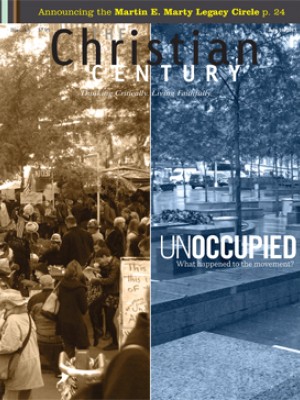SBC agrees to disagree over Calvinist trend
Can’t we all just get along? That was the question Southern Baptists, torn between Calvinists and non-Calvinists, seemed to be asking as they opened their annual meeting in Houston.
Frank Page, president of the Southern Baptist Convention’s executive committee, created a 19-member advisory committee that produced a report in time for the meeting titled “Truth, Trust and Testimony.”
Southern Baptists have been divided over Calvinism since their denomination began in 1845, but Page said on June 10 that disagreements had reached a tipping point.
“The truth is, I see an anti-Calvinism now that frightens me; it’s a vitriol that is nasty,” he said, adding he also has friends who were concerned about “extreme Calvinists.” “So it was my opinion that we need to deal with this. . . . Trust is hitting a new low.”
Calvinism, based on the teachings of 16th-century Protestant Reformer John Calvin, differs from traditional Southern Baptist theology in key aspects, particularly on the role of human free will and whether God chooses only the “elect” for salvation.
Read our latest issue or browse back issues.
The 3,200-word report calls for mutual respect between the differing factions, saying opponents should talk to each other rather than about each other, especially on social media. Churches and pastors also need to be honest about whether they embrace or shun Calvinism, it said.
“We agree that the gospel should be proclaimed to everyone, but we differ as to whether or how every hearer will be enabled to respond,’’ the report says.
In a brief presentation Page prayed that the report’s message would be heeded. “When we are tempted to talk about each other and at each other,” he prayed, “may we be reminded of your call to Christian civility.”
The document urges Southern Baptists to move beyond arguments to agreement on spreading the gospel. “We deny that the main purpose of the Southern Baptist Convention is theological debate,” it says, noting that the next generation of Southern Baptists should not have to wonder if the denomination is “on mission or [is] merely a debating society.”
Committee members with differing views seemed to agree.
“The Lord called us to be one,” said Steve Lemke, provost of New Orleans Baptist Theological Seminary and coauthor of a book critiquing Calvinism. “It’s his desire that we be one—one in spirit and mind, one in Christ. He didn’t say we have to be one in theology or one in worship style.”
Added Mark Dever, a pastor in Washington, D.C., and an outspoken supporter of Calvinism: “The things that we have in common really are more important than the disagreements that we have.”
Tammi Ledbetter, news editor of the Southern Baptist Texan news journal, said it’s up to individual Southern Baptists to determine what happens next.
“In a way I suspect all the people who really give a flip about this are here right now or listening on the Internet, so it’s really up to all of you as to what happens with this,” said Ledbetter, the sole woman on the committee.
In other business, Southern Baptists overwhelmingly voted to stand with churches and families that have severed ties with the Boy Scouts of America following its decision in May to allow openly gay Scouts, and they urged the BSA to remove leaders who supported the change in policy. They also acknowledged the right of SBC churches to remain in Scouting, urging them to “seek to impact as many boys as possible with the life-changing Gospel of Jesus Christ.”
The Baptists’ resolution stopped far short of calling for an all-out boycott, as they did in 1997 with the Walt Disney Co. to combat what they saw as the company’s gay-friendly policies. That boycott was ended in 2005. “This isn’t Disney redux, as some media predicted,” tweeted Russell Moore, the new head of the SBC’s Ethics and Religious Liberty Commission. He called the move “wise, balanced, and gospel-focused.”
[Meanwhile, United Methodists, whose churches sponsor 6,700 Scouting units compared to 4,000 units at SBC congregations and other Baptist churches combined, are already starting to welcome ousted Cub Scout packs and Boy Scout troops. “Our troops are open to all persons, regardless,” Chuck Jones, president of the National Association of United Methodist Scouters, told ABC affiliate WATE-TV in Knoxville, Tennessee.] —RNS






